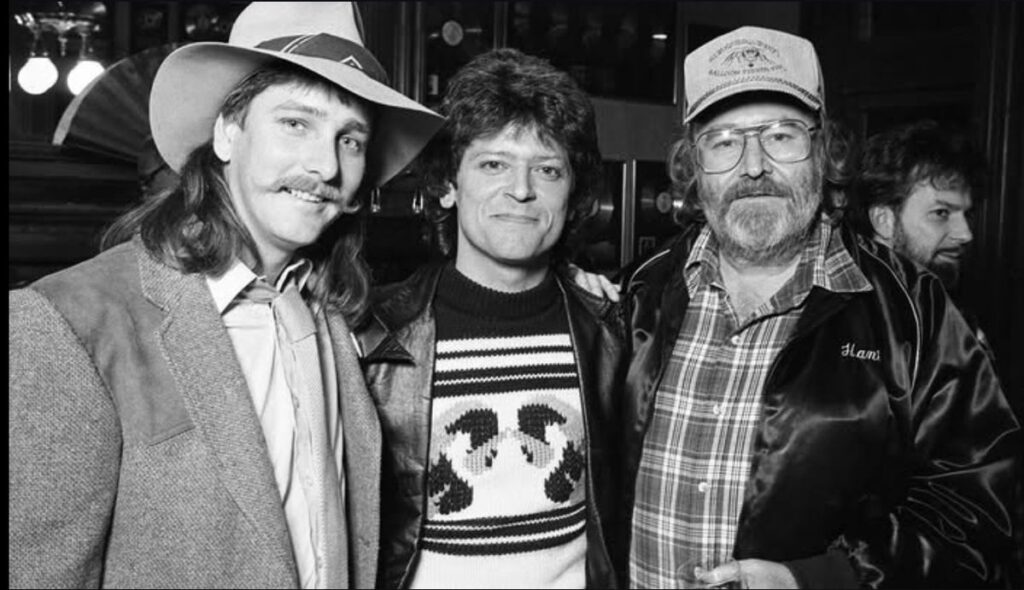
Johnny Rodriguez’s Timeless Ballad of a Relationship at a Crossroads
In the annals of country music, certain songs don’t just tell a story; they capture a moment, a raw, universal feeling that resonates across generations. Such is the case with Johnny Rodriguez‘s 1973 classic, “(Just Get Up And) Close the Door.” A quintessential example of the heartfelt balladry that defined the era, this song is more than just a tune—it’s a poignant reflection on the fragile line between unspoken tensions and outright confrontation in a failing relationship. It’s a somber, deeply personal plea to salvage a final moment of intimacy before everything falls apart. For those who came of age in the 1970s, the song’s opening notes and Johnny Rodriguez’s smooth, earnest voice are an instant time machine, transporting them back to a simpler, more introspective time.
Released as a single from his album All I Ever Meant to Be, “(Just Get Up And) Close the Door” became an instant success, a testament to its powerful emotional resonance. It climbed to the coveted No. 1 spot on the Billboard Hot Country Singles chart in the fall of 1973, holding the position for two weeks. This chart success wasn’t a fluke; it reflected the song’s ability to tap into the collective experience of heartache and the quiet desperation of a love on the brink. While it didn’t cross over to the pop charts, its dominance in the country music sphere solidified Johnny Rodriguez‘s place as a major star. He had already found success with hits like “You’re a Little Too Late” and “Ridin’ My Thumb to Mexico,” but this single proved his staying power and his ability to deliver deeply emotional performances that connected with his audience on a profound level.
The story behind the song is as simple and powerful as the lyrics themselves. The song’s genius lies in its simplicity. It paints a vivid picture of a couple, likely at the end of a long, silent evening filled with unspoken bitterness. The woman, perhaps out of a desperate need to escape the suffocating quiet, suggests going out. The man, the narrator, counters with a plea born of weary resignation. He’s not angry; he’s heartbroken. His suggestion—“just get up and close the door”—is a request for a final, private moment. He wants to shut out the world, to stop pretending, and to try and find a way back to the love they once shared, away from prying eyes and the cold, harsh light of public scrutiny. The door, in this context, is more than just a physical object; it’s a symbol of their final chance at reconciliation, a barrier against the inevitable end. The lyrics convey a sense of quiet desperation, a last-ditch effort to keep a dying flame from going out entirely. It’s a silent conversation, a negotiation of a last-ditch effort to rekindle a lost spark. The meaning of the song is beautifully complex. It’s about a man who refuses to give up, even when it seems hopeless. He is not trying to control the situation; he is trying to preserve what little is left of their love and privacy.
The song’s nostalgic pull is undeniable. For many, it evokes a time when country music was defined by raw emotion and storytelling. It was a time when songs were about real people with real problems. The unadorned production, the gentle guitar, and Rodriguez‘s sincere delivery make the listener feel like a silent witness to this private moment. It’s a memory, a feeling of bittersweet remembrance. The song’s enduring legacy is a testament to its honest portrayal of love and loss. It’s not a song of happy endings, but a reflection on the difficult, often painful, moments that define a relationship’s final chapters. His voice, a soothing balm over the heartache, makes the song less of a lament and more of a whispered confession. For those who remember hearing it on the radio for the first time, it was a moment of recognition—a song that said what they couldn’t find the words for. It’s a reminder that sometimes, the most profound love stories are not the ones with grand gestures, but the ones with quiet, desperate pleas to simply close the door and stay. It’s a timeless song that continues to speak to anyone who has ever faced the quiet crisis of a love in jeopardy.